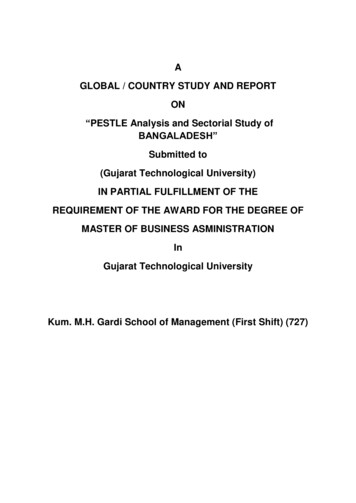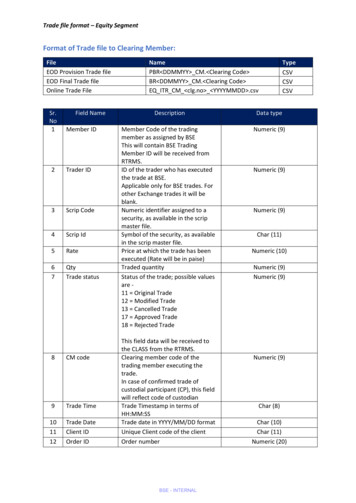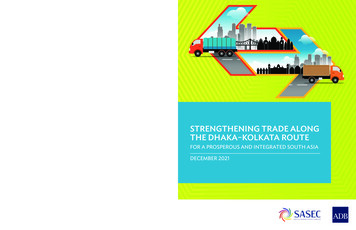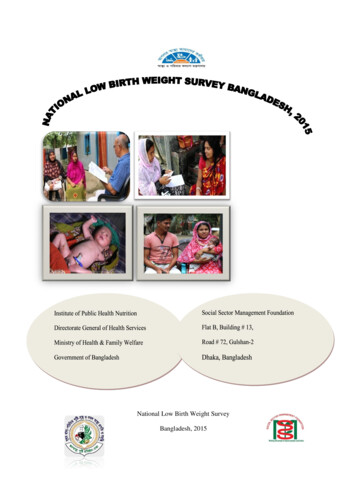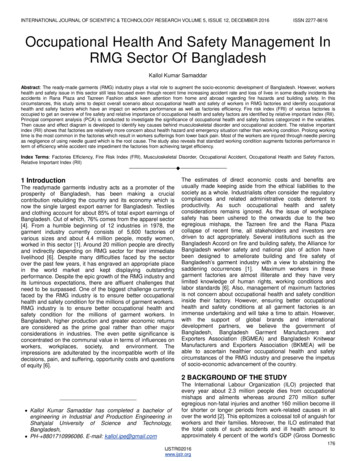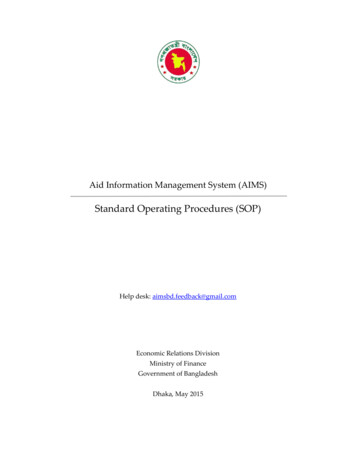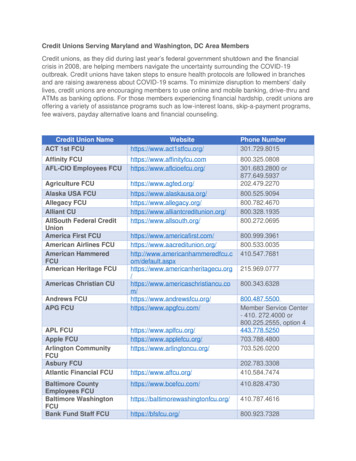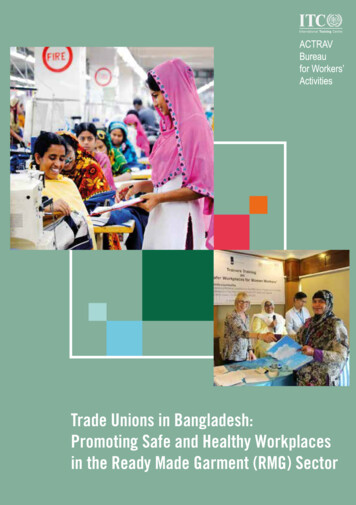
Transcription
Trade Unions in Bangladesh:Promoting Safe and Healthy Workplacesin the Ready Made Garment (RMG) Sector
ForewordThis advocacy tool draws on theexperience and progress in buildingthe capacities of trade unions withthe support of the ILO ACTRAV, theILO RMG Programme in Bangladeshand ACTRAV Turin to strengthentheir organizational and technicalcompetencies to promote occupationalsafety and health.In recent years, the RMG sector inBangladesh has experienced a highnumber of workplace accidentsincluding the fire at Tazreen Fashionsand the collapse of Rana Plaza, a singleincident that claimed the lives of over1,200 workers. These events have hadtremendous impact on workers’ safetyissues and in the overall RMG sector inthe country.A Joint Tripartite Statement by theGovernment of Bangladesh (GoB),adopted in 4 May 2014 helped catalysethe process of the development andimprovement of policies, advocacywork and capacity building in the RMGindustries, but more work remains to bedone.Given the large presence of womenin the RMG sector, efforts to raiseawareness and build campaignswill give special attention to the newgeneration of women who are makingtheir initial steps in the workplace aswell as in the trade union activities.We wish women to take part inprocesses and to make their voicesheard to improve working conditions,including Occupational Safety andHealth (OSH) in the RMG sector. Aspart of the UN system in Bangladesh,the RMGP supports the Governmentof Bangladesh in achieving its fiveyears’ plan and especially SDG Goal 8(Decent Work and Economic Growth).The main purpose of the advocacytool is to highlight the important roleand responsibility that unions couldcontinue to play in building properworkers’ awareness and action on OSH,building a preventative culture andhelping establish OSH committees inworkplaces. Trade unions are a centrepiece in building safer workplaces.“We cannot wait for future disasters before we act to make theworld's factories and workplaces safe and decent places to work.Better working conditions are in everyone’s interests; a safer industrydoes not mean a less profitable one".Guy Ryder, Director General ILO
UNION workplaces areSAFER workplaces.Bangladesh celebrated National Occupational Safety and Health Day on 28 April 2017Bangladesh RMG sector at a glanceRMG Sector: Over 3,500 exporting factories Around 4.2 million workers 55%-60% womenExport and Trade union presence 24.5 billion USD total RMG export earnings (2013-14) 80% of national export 3.5-4% factories with union presenceSource: ILO RMG Programme
Case study 1OSH Training Follow-up phaseAfter participation in training activitiesunder the ILO’s RMG prgramme, tradeunions have been more active and betterequipped to promote better workingconditions and replicate the content of thelearning to other workers. This case showsthe training follow-up.The follow-up actions of an OSH training willbe as follow:1. Train union leaders at factory level aboutoccupational health and safety issues;2. The trade union has to ensure that tradeunions representatives have a voice in thesafety committee3. Undertake periodic union activities(every three months) in non-unionisedfactories to raise workers’ awareness onsafety committees and support workers toform OSH committees;4. Work actively to resolve safety issuesin factories, including providing legalassistance if necessary, and inform buyersand Bangladesh Accord on Fire andBuilding Safety.According to Ms. Rahman, a trade uniontrainer, “we are getting good results inraising awareness on OSH among workersand promote a safety culture, but a lot hasto be done. We are ready to work withgovernment and employers to make surethat OSH is respected and safer workplacesare guaranteed to workers”.Source: China R., RMGP programme, Dhaka,March 2017.
Building Union Capacity through Improving Working Condition inthe RMG SectorAs part of the ITCILO capacitybuilding support, in partnership withILO Country Office for Bangladesh,ACTRAV Turin, delivered a number oftraining activities targeting trade unionsand workers’ organisations to enablethem to promote OSH.The activities involved a core groupof committed and dedicated tradeunionists: workers, supervisors andmanagers in the RMG sector to improvesafety in the workplace, especiallyfocusing on prevention.The core group comes mostly fromaffiliated unions under the NationalCoordination Committee for Workers’Trade UnionCapacity Building on OSH.Actual total target beneficiariesare 2,355 NCCWE and IBC membersFemale: 1,560;Male: 790 affiliated union organizers26 women leaders/organizers,including 11 from NCCWEand 15 from IBCEducation (NCCWE) and the IndustriALL Bangladesh Council (IBC). Sincethe project started in 2014, 64 coretrainers, of whom 31 were women,have attended the training. Thesetrainers are now actively promotingthe implementation of appropriateOSH actions and programs in RMGworkplaces.In addition, the capacity building mayhave an indirect impact on promotingaccess to unions and their services.Qualified members for the core groupcarried out follow-up activities at theunion and enterprise level with thesupport of the ILO.Key point.If you are working in the RMG sectoror any other sector in Bangladesh, nomatter what age or gender, you areentitled to rights and dignity at work,including the right to join a tradeunion and to work free from unlawfuldiscrimination and harassment.As indicated by examples in thismaterial, trade unions are valuablepartners to promote and implementOSH in the workplace.
Focus on OSH activities in the workplace: views from SocialPartnersIn the four years since the Rana Plazadisaster there has been a lot of focus toimprove the safety and overall workplacesituation in the RMG sector, and inother industrial sectors in Bangladesh.The ILO and social partners have beenvery active and supportive of suchactivities. Employers now understandthat a safe and healthy workplace isa prerequisite for efficient productivityand smooth operation of an enterprise.It is our firm belief that working together with thedevelopment partners and the government,we shall be able to bring in the required reformsat the workplace, and industrial accidentsof such scale will not happen again.Salahuddin A. K. KhanPresident, Bangladesh Employers’ FederationKey point.Scientific evidence and workers’perception show that when workersare represented by trade unionson occupational health and safetyissues, their working environment issignificantly better than where they areleft alone with their concerns.An independent study by StanfordUniversity found that “unionisationin mining operations predicts 18-33percent drop in traumatic injuries and27-68 per cent drop in fatalities”.Source: Morantz A., Standford University, 2011.Owners/managers can inform workersabout necessary actions to take toimprove the safety of factories in manyways. The better-informed workers are,the easier it is to gain their involvement.The attention on OSH contributes tocreate the enabling environment forengaging workers and employers insocial dialogue and dispute prevention.Effective social dialogue is thecornerstone of the policy process.It is essential for credible andeffective OSH policies formulationand implementation. Trade Unionsunderstand the importance of fosteringtogether a preventive safety andhealth culture which also strengthensworkplace occupational safety andhealth (OSH) systems.
Overall, some progress has beenachieved in the following areas: Updating the National OSH Profileand developing a National Plan ofAction on OSH. Workingwithemployers’organisations to cascade basic OSHtraining to 750,000 – 800,000 workersin 585 RMG factories. Providing OSH capacity buildingto master trainers from NCCWE andIBC who will pass on these skills tosome 3,000 workers. Developing an OSH KIT forinitiating and building capacities ofSafety Committees at factory level. Preparing advocacy and outreachcampaign on OSH to help foster aculture of OSH in the country. Supporting the establishmentof Safety Committees in Better Workfactories. Raising women workers’ issuessuch as sexual reproductive healthrights, sexual harassment, adopting agender approach to OSH, leadershipand communication skills. Outreaching training activitiesthrough the Bangladesh Instituteof Labour Studies (BILS) involvingNCCWE and IBC affiliated uniontargeting 2,355 workers at factory level.
Case study 2:Favouring OSH policiesSahida has worked for the Solar GarmentsLimited since 2005. There are 250 workersin the factory, of whom 205 workersare women. She participated in at thetraining on workplace health and safetyby Bangladesh Garments and IndustrialWorkers Federation, funded by ILO.She learnt that staying safe in factories andworking in conducive a environment are thelegal rights of all workers. Sahida herselfprovided the manager with the list of SafetyCommittee members and discussed its rolewith them.Afterwards, Sahida and the SafetyCommittee members went to see the factoryowner and informed him about the followingactions:1) the Safety Committee provided threeadjustable fans and replaced three newfans,2) the Committee removed scattered wireand sewing machines now fitted withneedle guards;3) a guard has been placed on the exitstaircase.Sahida would like to see more SafetyCommittees in the RMG sector because shethinks that is beneficial for both employersand workers. Sahida said to the managerthat if workers worked safely they wouldn’tget ill. She affirmed that it would increaseproductivity and workers will feel safe intheir workplace. After several discussionsabout workers’ rights and the potentialstrike actions, the manager took steps toresolve the issues.Souce: Morion F., RMGP programme,Dhaka, March 2017.
Unions in the forefrontThe role of trade unions in Bangladesh,now more than ever, is crucial to ensurethat the rights and interests of workersin the country are safeguarded andprotected. Trade unions have made thefollowing as their priorities: Improve working conditions,provide input on legislation and policydesign; End violence and harassmentagainst women and men in theworkplace; Promote Occupational Safety andHealth (OSH) awareness, capacity, andsystems; Increase the direct interactionbetween employers’ and workers’organisations on issues relating tolabour inspection and OSH, which aretwo relatively un-controversial subjectsamong the social partners (comparedto e.g. strikes and wage increases). Upgradeworkers’skills,rehabilitation and skills training forvictims. policies and programmes, includingcollective bargaining to promotewomen workers’ rights.Trade unions have placed OSHat the core of their functions andresponsibilities.Trade unions’ activities must be focused,rights based, efficient and aligned withregulatory measures provided in theBangladesh provisions provided in theBangladesh Labour Act (2006) andthe Labour Rules (2016).In addition, capacity building effortshave made significant impact on unionactions and activities. According toOSH trainers interviewed in Dhaka inMarch 2017, since the OSH trainingactivities begun, more than 1,300workers, mostly women, have becomemembers of registered RMG unions forthe first time. Activities carried out alsoallowed unions to join and cooperatewith other stakeholders. As anexample, unions celebrated OSH Daylast 28 April 2017, together with socialpartners and civil society, as a part ofthe OSH media campaign.Mainstream gender issues in allKey point.OSH is a good recruitment and organising tool,it is a personal as well as a collective issue.Ask workers what their main problems are and inform themhow the union can support them.
Case study 3:Improving working conditionsSince 2009 Anju has worked at JesusFashion Limited. She attended theOSH training organized by BangladeshGarmentsandIndustrialWorkersFederation supported by the ILO andBILS. The training raised Anju’s awarenessabout the importance of occupational risksand hazards so much that she wanted toteach and sensitize other workers about theimportance of preventive measures to avoidaccidents in factories.Anju spoke to the factory manager, aboutsetting up a Safety Committee. Sheprovided the names of workers and shenegotiated a successful agreement basedon women workers’ demands. The SafetyCommittee brought to the factory safedrinking water, replaced old fans with newones and installed one more adjustable fanto cope with the heat during working hours;they removed cartons from the staircaseand walking areas; they placed a guardat emergency exit and kept the exit dooralways open. Anju is now the Presidentof Jesus Fashions Trade Union but stillbelieves that there is a need to continuefollow-up training, particularly about safetyprovisions under the labour law.Source: Mosammat Anju Begum, Jesus FashionLimited, Dhaka, March 2017.
What more needs to be doneThere are still some challenges with owners who are afraid that ifunions form in their factories that productivity will suffer but the oppositeis true. We need to show that unions will be good for business. MoreFreedom of Association and Collective Bargaining will help lead toDecent Work and better factory productivity.Alhaj Sukur MahmudPresident of JSL (Jatiyo Sramik League)According to comments offered byOSH trainers, future capacity buildingactivities should involve: Moreinclusivetraining,especially at the factory level. More in-depth knowledge onlabour law and legal provisions. Participatory learning methodsfor adults, especially visual (photosand video) to keep workers engaged. Further OSH-related materialswhich integrate discussion aboutworkers’ rights and industrialrelations.Work is now underway to build adedicated multi-disciplinary safetyagency so that the competenciesand skills developed over the 20132017 are combined in one agencythat can manage structural and firesafety in industrial production. Towardssupporting RMG affiliated unions, thenew ILO programme on Social Dialogueand Industrial Relations (SDIR Project)has established Workers ResourceCentres, a joint platform for advocacy,capacity building, labour disputesettlement and collective bargaining.The key tasks are to consolidate thegood work achieved so far and tofurther build a sustainable regulatoryframework for the long term. Bydoing so, we will create significantand positive OSH changes for theworkers employed in the RMG sectorin Bangladesh.Future areas of Union actionon OSH1. Identification of risks2. Information and training3. Participation in Safety Committees in the workplace4. Organisation of actions, evaluation and follow-up5. Building a culture of respect towards the health, safety and well-being of workers
Where to find more information and ingmaterials through ILO’s htm both in English and Bengali,including the following:A new ILO social dialogue initiativefunded by Sweden and Denmark willfocus on the development of dialoguemechanisms and relations at workplacelevel between employers and workersover the next few years. Publications, manuals, legalinstruments on labour inspection andOSH;Meanhwile. ILO’s RMG programme isset to enter a second phase to carry onits work to enhance workplace safetyand governance. Standard procedures and toolsto ensure consistency in labourinspections;labourYou can find more information aboutthe projects and materials developedthrough the ILO website and ILOCountry Office in Bangladesh website.The ILO is ready to continue itssupport towards the enhancement ofworking conditions and labour rights inBangladesh.ACTRAV-Turin also created a virtualspace to provide a collection of somegood examples which tap into emergingpractices and contribute to implementsocial dialogue in Bangladeshi RMGsector. Good practicesinspection and OSH; onSelf-study materials.Covers of visual aids material for ILO RMG workers produced under the project
Impossible toachieve OSHwithouttrade unionsSource: International Trade Union Confederation (ITUC)
ILO’s activities to improve working conditions in the Ready Made Garment Sectoras well as to improve labour rights and social dialogue are supported by
In recent years, the RMG sector in Bangladesh has experienced a high number of workplace accidents including the fire at Tazreen Fashions and the collapse of Rana Plaza, a single incident that claimed the lives of over 1,200 workers. These events have had tremendous impact on workers' safety issues and in the overall RMG sector in the country.

